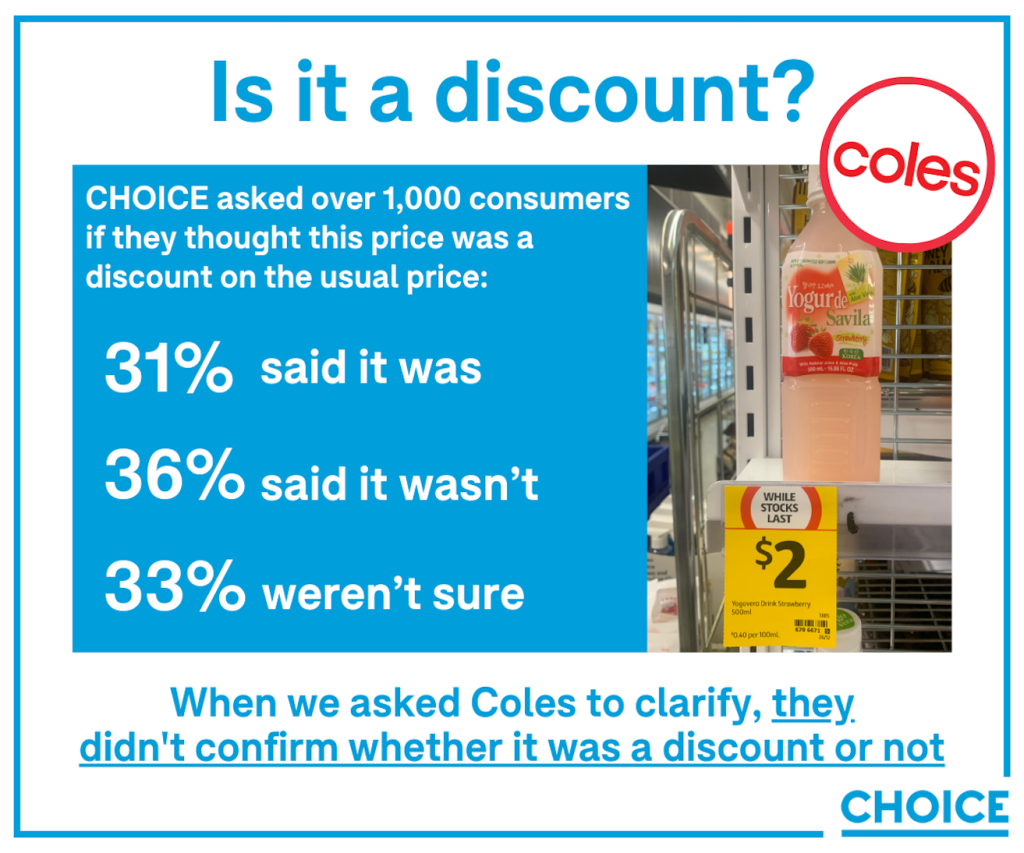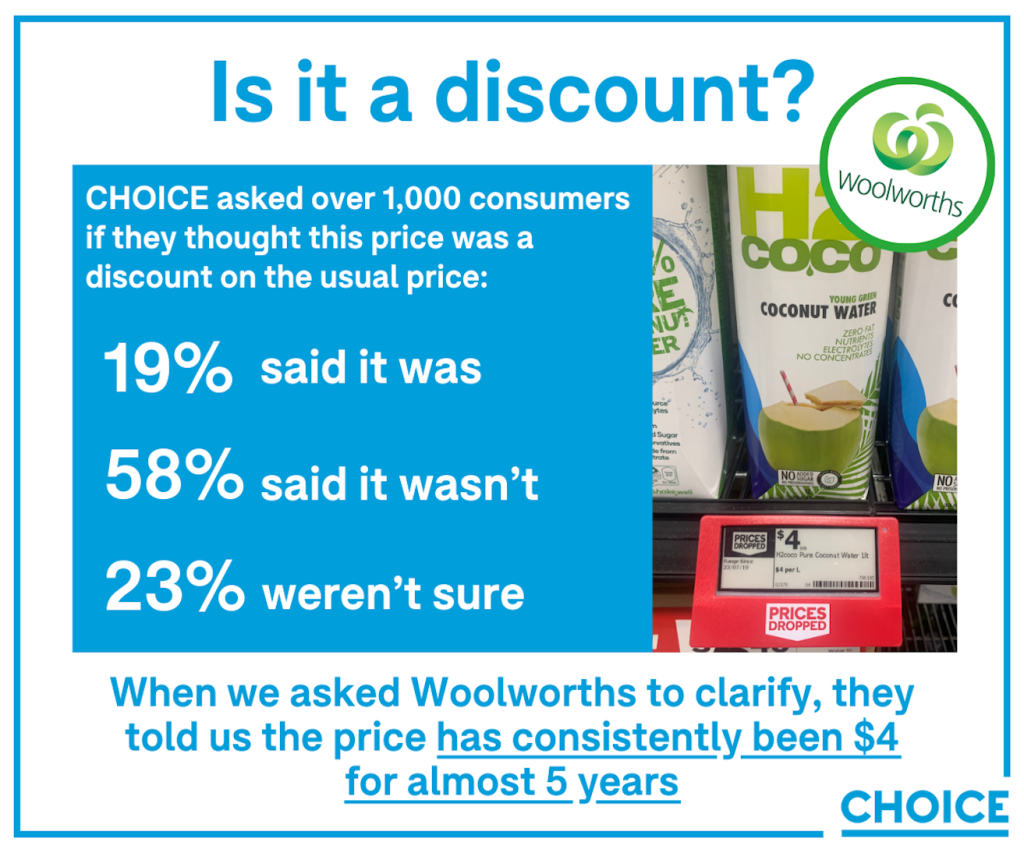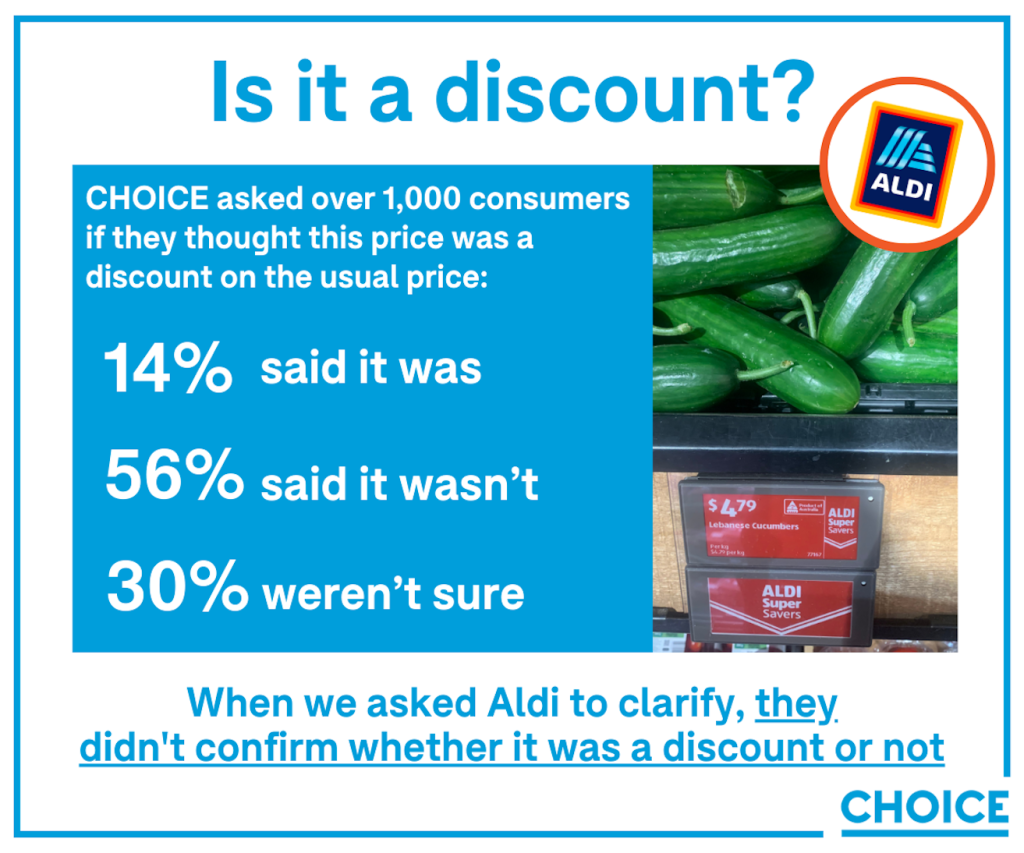Choice research finds Australian supermarket labels are largely confusing

Source: Choice
Tags and labels that bedeck the shelves of our supermarkets are confusing shoppers, research from a leading consumer advocacy group has found.
Consumer group Choice found that about one in four shoppers find it difficult to determine whether certain supermarket labels are actually showing a true discount.
It survey more than 1000 people in February, asking them if price tags common to the three big retailers – Coles, Woolworths and Aldi – represented discounts on the usual price.
Shoppers were also asked if they could quickly and easily determine whether tags indicated there was a discount.
Choice has already made a submission to the Australian Competition and Consumer Commission’s supermarkets inquiry and has been vocal about the need for stronger rules about how prices are being displayed.
“We have had hundreds of people share examples of potentially misleading pricing practices at the major supermarkets, with many being confused about whether a product is discounted or value for money,” Choice director of campaigns Rosie Thomas said on Monday.
“People are sick of feeling like they are being tricked by the supermarkets each time they head in store or online.”
The ‘most confusing’ tag
Choice said the most confusing image for shoppers was a “while stocks last” tag used by Coles.
They were asked if they thought it represented a discount on the usual price. About 33 per cent said they weren’t sure, 36 per cent believed it did not represent a discount, and 31 per cent said it was.
Choice said it asked Coles to clarify, but the retailer did not confirm whether or not a “while stocks last” tag actually meant a reduced price. In a statement to TND, Coles said it would update that ticket.
A Coles spokesman said the company used “several mechanisms” to help customers find “great value deals”, including weekly specials and promotional campaigns, which remain at a lower price for up to 13 weeks. They include the “while stocks last” tickets.
” ‘While stocks last’ tickets also offer customers the chance to buy items which are only available at Coles for a short time, and which are unlikely to be restocked once the products are sold through,” the spokesperson said.
“Customer feedback is important to us. Our goal is to always be as clear as possible and we are taking steps to update this ticket over the coming months.”
Thomas said the “countless” labels used by the major supermarkets were clearly confusing consumers, “who are struggling to determine what is and is not a genuine discount”.
“This is particularly concerning, considering many people are trying to make their grocery shop as affordable as possible in a cost-of-living crisis,” she said.

Coles’ ‘while stocks last’ label was the most confusing for shoppers. Image: Choice
‘Prices dropped’ and ‘super savers’ cause confusion
Over at rival Woolworths, it’s ‘‘prices dropped’’ label was also an issue for shoppers.
Only 19 per cent of consumers were sure it indicated a discount on the usual price, while 58 per cent said it wasn’t and 23 per cent were not sure.
Choice used the example of H20coco Coconut Water to illustrate the confusion.
“The price of this coconut water dropped back in 2019, when it was reduced from $6 to $4,” Thomas said.
“We have doubts about whether a product that has been the same price for almost five years should be promoted as having a ‘dropped’ price. It’s no wonder consumers were confused as to whether it’s actually discounted or not.”

Woolworths’ ‘prices dropped’ tag was also divisive. Image: Choice
“We know many Australian families are doing it tough and looking for relief at the checkout,” a Woolworths spokesperson told TND.
“We strive to clearly and simply signpost the ways that our customers can find value and spend less every time they shop with us.
“We know that the majority of our customers are buying products on special or on an everyday low-price offer to help them save.”
Meanwhile, about a third of the people surveyed were unsure if Aldi’s ‘‘super saver’’ label was meant to promote a discount. In all, 56 per cent said it wasn’t and only 14 per cent said it did.
“Again, less than half of the respondents said they could quickly and easily tell if it was a discount or not,” Thomas said.

Aldi’s ‘super saver’ tickets were also confusing. Image: Choice
“Our model of everyday low prices means we have permanently low prices across our range creating savings for customers across a whole basket, not just on a select range of products,” an Aldi spokesperson said.
“We do not offer price markups and discounts across our grocery range, otherwise known as high-low pricing, providing certainty and reliability to our customers.”
When Aldi was approached by Choice, it did not confirm what the label actually meant.
TND understands super savers are weekly and fortnightly offers on produce, meat, fresh seafood and bakery items that are discounted.
“It is disappointing that none of the supermarkets we spoke to acknowledged the harm that these confusing labels are causing. This is why we need stronger laws around pricing practices that would ensure supermarkets do right by consumers,” Thomas said.








